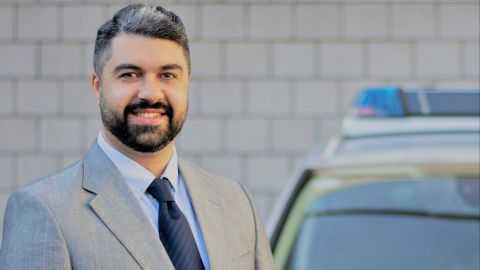Frank Rentmeister from Borken and Bahman Pournazari from Siegen-Wittgenstein approach their task with great commitment. Frank Rentmeister (57) relies on his experience, more than 40 years in the police force. "Gut instinct is one of the most important indicators in many areas of life," says the press spokesman for the Borken district police. Police officers should also rely on their gut feeling if they suspect something is wrong: There's something wrong with my colleague. Strange remarks, strange reading, strange symbols - is he or she leaning towards extremism?"
In future, police officers in the Borken district will be able to contact Rentmeister if they have concrete information or just a strange feeling. He is one of the extremism officers who have been taking on this new task alongside their normal duties in all 50 police authorities in the state since May.
Just like Bahman Pournazari (36) at the Siegen-Wittgenstein district police. "The subject area is complex and dynamic," says the government employee. Extremism is constantly changing and constantly producing new constellations. The alliances that have just emerged during the coronavirus demonstrations are examples of this.
In early March, Interior Minister Herbert Reul announced the appointment of the extremism commissioner in the state parliament's interior committee. The background to this was the case of an administrative officer at Hamm police headquarters who was taken into custody in mid-February on suspicion of being a member of a right-wing terrorist organization.
The extremism commissioners are to be the point of contact for their colleagues in suspected cases - beyond the hierarchical structures. They are supposed to be confidants in two senses. On the one hand, they are appointed by the heads of the authorities and are therefore under a special obligation to them. On the other hand, they need the trust of the employees so that they can turn to them if they recognize any indications of extremism.
"What I bring from my biography is the decisive factor," says Pournazari about his qualifications for the task. He fled to Germany from Iran with his family in 1991. As an immigrant, he experienced hostility. Kickboxer, social pedagogue, involved in police prevention work with drugs, violence and radicalism - Pournazari knows what he is talking about when it comes to the fringes of society. "I've found a way to deal with it calmly and objectively," he says.
"You don't have to know every symbol and every slogan," emphasizes Rentmeister. "But I know who I can turn to." He is also concerned with sensitizing his colleagues to the issue of extremism. "Public awareness of the issue has increased," he observes.
He does not see "a structural problem" in the cases of extremism in the North Rhine-Westphalian police force: "These are individual cases, but they are bad cases. It is good that such consistent action is being taken."
Since 2011, the State Office for Police Training and Personnel Affairs (LAFP) has been recording people suspected of extremism. By the end of 2019, there were a total of ten suspected cases; in the first five months of this year, there were 15. "On the one hand, this is an expression and at the same time proof of our joint approach and our sensitivity," explained LAFP Director Michael Frücht, "but on the other hand, it is also mainly due to two complexes in Hamm and Aachen this year, each involving several people, with a peak of five employees."
For Reul, "right-wing extremism is now one of the greatest threats to democracy". The minister admitted that he could not have imagined the scale of the problem until around six months ago. Among other things, he recalled the assassination of Kassel District President Walter Lübcke a year ago.

